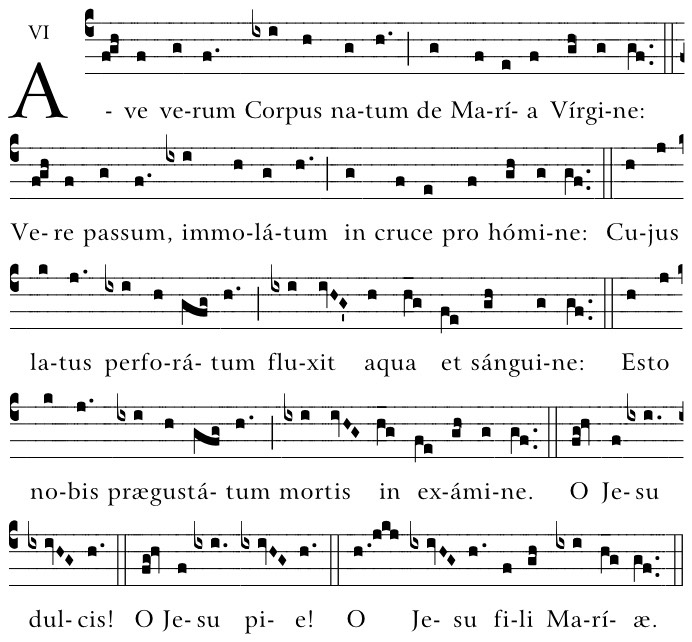Ave verum corpus
Ave verum are the opening words of a late medieval rhyming prayer in Latin. It was probably built in the 13th century; the author is unknown. The text has its headquarters in life in the Eucharist worship. The believers greet the true body of the Saviour in the form of the sacrament bread and worship the salvation sufferings of Christ. The prayer ends in the request for the reception of Communion in the hour of death as a foretaste of heaven.
Text
Version of Mozart
Version without Mozart's music -related changes
Translation
Transfers
Rhythmic
Rhymed
Adapted
The following text can easily be adapted to be sung to Mozart's setting.
Textual history
The Latin prayer rhyme has been included in many collections of religious texts and songs since about 1300. In comparison, the transcripts show many deviations, partly by accident, partly as a deliberate addition or redesign.
The oldest known record comes from Genoa (about 1294 ). Another copy is called as the author of Innocent IV, Pope from 1243 to 1254, born in 1195 also in Genoa. Subject, vocabulary, manipulation of meter and Latin style include an attribution to St. Thomas Aquinas (1225-1274) at least not enough.
As far as we can reconstruct it from the many variants, the following prayer seems originally to have had:
It is striking that forms the vocabulary verum be ' genuine, true, real ' used repeatedly, apparently to express to that body is not meant in a figurative sense, but really existing, consisting of flesh and blood body of man Jesus called. Counter vero in v. 6, however, speaks the frequent encounters, gospel close reading fluxite unda_et sanguine, here by the palaeographic maxim lectio difficilior propior supported.
For almost a third of the words variants are known, additives or partly rhythmically rhymed and partly in prose, also a second verse to the same rhyme scheme. This rhyme scheme follow the way the sequences Ave virgo gloriosa panis Angelorum and Ave.
Let it be known, many records, the believing Christian can be 40 days 300 days or 3 years buys indulgences, when he spoke the prayer or its first few words in the elevation or own devotion before the Blessed Sacrament.
Compositions
According to the sources of the text was sung much in the middle ages, so had even then a melody.
Many composers set to music the text, including Guillaume you Fay, Josquin Desprez, Francisco de Peñalosa, Orlando di Lasso, William Byrd, Peter Phillips, Richard Dering, Wolfgang Amadeus Mozart, Franz Liszt, Charles Gounod, Camille Saint- Saëns, Edward Elgar, Francis Poulenc, Colin Mawby, Karl Jenkins, Imant Raminsh and György Orbán.
Today's most popular and most performed musical setting is that of Wolfgang Amadeus Mozart. His version was the old sequence widespread outside of church events. The text is considered under Christian doctrine, the bodily presence of the Saviour in the Eucharist. The last lines refer to the model of the dying Saviour for his faithful followers. Although the know only a few; nevertheless choose survivors as musical accompaniment for funerals often these contemplative, exciting and last comforting music of Mozart.
Mozart composed the 46 clocks for choir, strings and organ (KV 618) almost half a year before his death, while he also worked on The Magic Flute and the Requiem. The autograph is dated 17 June 1791. The composition was determined for the Feast of Corpus Christi in Baden near Vienna, where Mozart's wife Constanze prepared in the ninth year of marriage to her sixth confinement. She lived with Anton Stoll, choirmaster of Baden's church choir, who accepted the motet for it as a gift. A year later, also composed Mozart's pupil Franz Xaver Süßmayr an Ave verum corpus for Anton Stoll.
Franz Liszt, Pyotr Ilyich Tchaikovsky and Francis Poulenc based Mozart's work as a quote in his own works an instrumental.
Hector Berlioz called the work as a model for proper use of the human voice:
"At an Andante [ for voices ] in held and soft tones will use [ the composer ] only the tones of the middle layer, since these alone have the proper timbre, to be specified with peace and purity and without the slightest effort endured pianissimo. It also has Mozart done in his heavenly prayer, Ave verum corpus '. "










